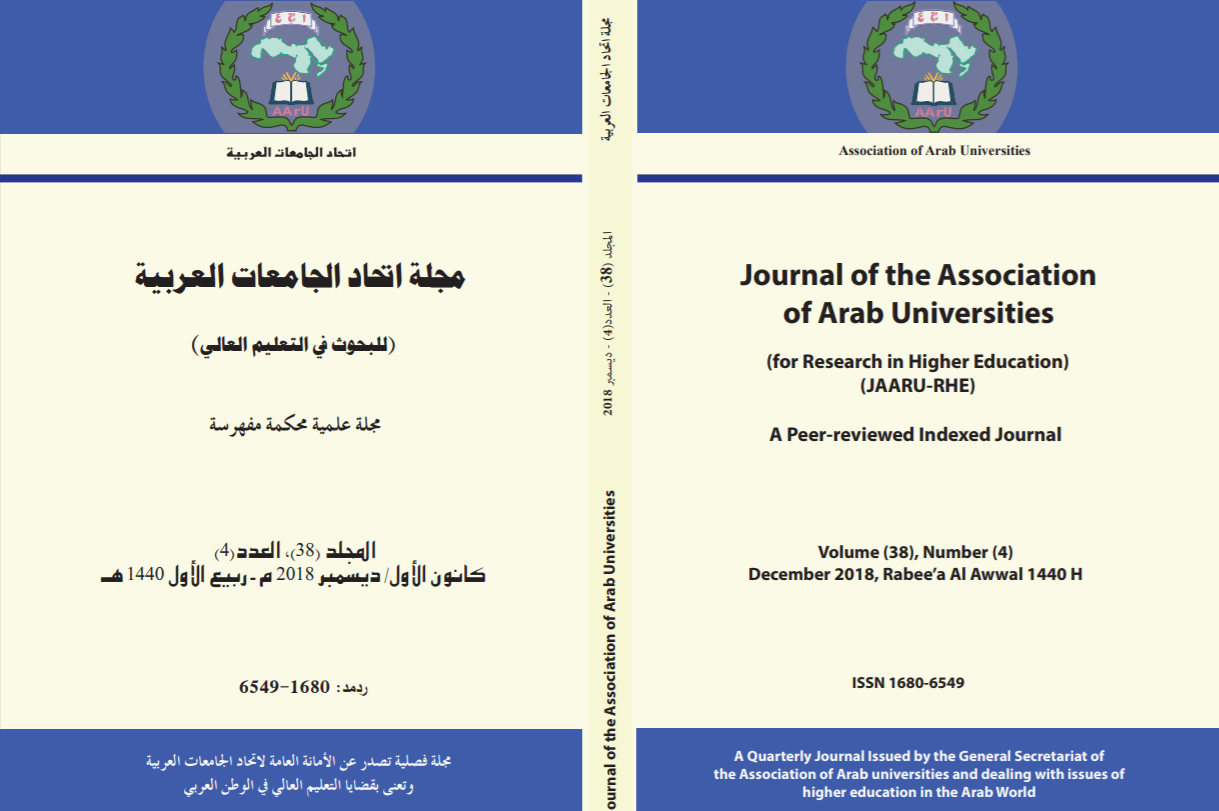Journal of the Association of Arab Universities for Research in Higher Education مجلة اتحاد الجامعات العربية للبحوث في التعليم العالي

Abstract
هدف المقال التعرف على أثر التربية الرقمية على التعليم الجامعي، ومعرفة أبرز المعوقات التي تواجه استخدام التربية الرقمية في المؤسسات التعليمية، والنماذج المستخدمة لاستثمار التربية الرقمية في العملية التعليمية، واعتمدت الدراسة المنهج النوعي في التحليل واستخلاص النتائج وعرض البيانات بالإطار الوصفي، من خلال ما تم تناوله في الأدبيات السابقة حول التربية الرقمية، واعتبرت الدراسة مفهوم التربية الرقمية بأنه امتلاك الأفراد للمهارات اللازمة للوصول لهدف ما باستخدام الأجهزة والتقنيات الرقمية، إضافة الى الاتجاهات والكفاءات في استخدام هذه التقنيات، والتي ترتبط بالقدرة على استخدام الحاسب الالي والهاتف النقال، والأجهزة اللوحية الذكية وصولاً الى شبكات التواصل الاجتماعي، والإنترنت، ليكونوا أكثر من مجرد متلقين للمعلومات من خلال هذه التقنيات، ليصبحوا مقيّمين، ناقدين وصانعين لهذه المعلومات. وخلصت الدراسة إلى وجود ثلاث نماذج لاستخدام التربية الرقمية في العملية التعليمية وهي الجزئي والمختلط والكلي (الرقمي)، مع التأكيد على أهمية استثمار التربية الرقمية في التعليم الجامعي والاستفادة من الإدوات الرقمية في التماشي مع التطور، وضرورة تجاوز المعوقات التي تقف أمام الإنفتاح الرقمي في العملية التعليمية، مع الحفاظ على الأخلاقيات والضوابط العلمية، وأوصت الدراسة بضرورة نشر الثقافة الرقمية من خلال منهج تدريبي فاعل لكل من المعلمين والمتعلمين، يتسم بالتطور والتجديد الدائمين مع ضرورة إشراك المتعلمين في صناعة المحتوى المعلوماتي بحيث تتجاوز العملية التعليمية منظور الاتصالية مرسل ومستقبل، لتصبح عملية ديناميكية تشكّل حلقة متكاملة
The article aimed to identify the impact of digital literacy on university education, the most prominent obstacles facing the use of digital literacy in educational institutions, and the models used to invest digital literacy in the educational process. The study adopted the qualitative approach in the analysis, drawing conclusions, and presenting the data in a descriptive framework. Digital literacy is the individuals possess of the skills necessary to reach a goal using digital devices and technologies, in addition to the trends and competencies in using these technologies, which are related to the ability to use computers, mobile phones, smart tablets, social networks, and the Internet, to be more than just recipients—information through these technologies, but also to become evaluators, critics and creators of this information. The study concluded that there are three models for the use of digital literacy in the educational process, which are partial, mixed and total (digital), emphasizing the importance of investing the digital literacy in university education and benefiting from digital tools in line with development, and the need to overcome the obstacles that stand in the way of digital openness in the educational process, while maintaining ethics and scientific controls. Moreover, the study recommended the need to spread digital culture through a practical training curriculum for both teachers and learners, characterized by constant development and renewal with the need to involve learners in the information content industry, so that the educational process goes beyond the perception of traditional communication, sender and receiver, to become a dynamic process that forms a circle integrated.
Recommended Citation
Abu Halka, Mohamad Ahmad
(2024)
"أثر التربية الرقمية على التعليم الجامعي,"
Journal of the Association of Arab Universities for Research in Higher Education مجلة اتحاد الجامعات العربية للبحوث في التعليم العالي: Vol. 44:
Iss.
1, Article 4.
Available at:
https://digitalcommons.aaru.edu.jo/jaaru_rhe/vol44/iss1/4

